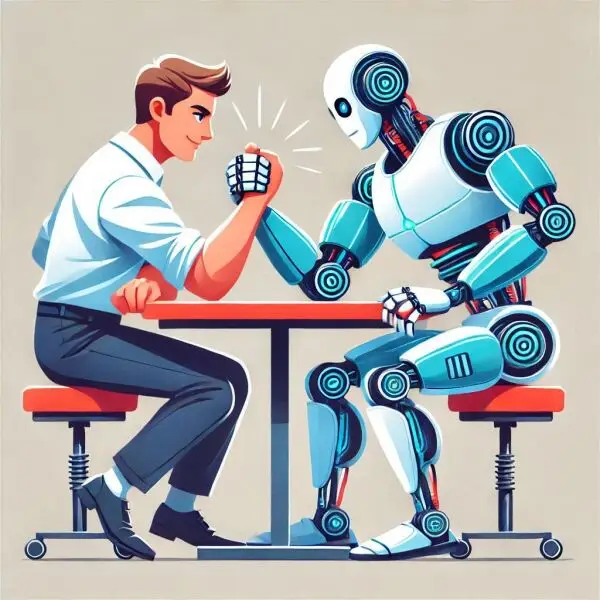Machines are surpassing humans in skills and intelligence: the milestones
Machines in power! AI has defeated humans in chess, contests, and ancient games. Who said machines don't have brains?...
Table of Contents
- AI on the Board: When Machines Challenge Champions
- Watson and the Art of Answering Impossible Questions
- AlphaGo and the Millennial Challenge of Go
- Beyond the game: the impact of AI in the real world
Follow Patricia Alegsa on Pinterest!
AI on the Board: When Machines Challenge Champions
Do you remember that moment in 1996 when the chess world was turned upside down? Yes, I’m talking about Deep Blue, IBM's supercomputer that dared to challenge the great Garry Kasparov. Although it didn't win the entire series, it managed to take one game.
A year later, in 1997, Deep Blue delivered the final blow and defeated Kasparov in a full match. Who would have thought that a machine could calculate 200 million positions per second? An achievement that left everyone speechless and a little worried.
Deep Blue not only changed the rules of the game but also redefined our perception of artificial intelligence. It was no longer just about machines performing monotonous tasks, but about systems that could outsmart humans in their own games of wits.
Deep Blue not only changed the rules of the game but also redefined our perception of artificial intelligence. It was no longer just about machines performing monotonous tasks, but about systems that could outsmart humans in their own games of wits.
Watson and the Art of Answering Impossible Questions
In 2011, artificial intelligence took another impressive leap when Watson, also from IBM, faced off against the titans of the television quiz show Jeopardy!: Brad Rutter and Ken Jennings. Watson's ability to understand questions in natural language and respond with speed and accuracy was undoubtedly a sight to behold. Although it made some mistakes (like confusing Toronto with Chicago, oops!), Watson amassed a resounding victory.
This event was not only a demonstration of technological strength but also a breakthrough in natural language processing. And, of course, it left viewers wondering: "What’s next?" (in the tone of Jeopardy, of course).
Artificial Intelligence is getting smarter every day while humans are getting dumber
AlphaGo and the Millennial Challenge of Go
Go! A game with over 2,500 years of history and a level of complexity that makes chess seem like a child's game. In 2016, AlphaGo, developed by DeepMind, amazed the world by defeating champion Lee Sedol. Using deep neural networks and reinforcement learning, AlphaGo not only calculated moves but also learned and improved in the process.
This showdown demonstrated that it wasn't just a matter of brute force, but of strategy and adaptability. Who would have thought that a machine could teach us about creativity?
Beyond the game: the impact of AI in the real world
These AI triumphs are not limited to games. Watson, for example, has jumped from the television studio to hospitals, financial offices, and even weather stations. Its ability to analyze huge volumes of data has revolutionized the way we make decisions. And what about AlphaGo? Its legacy continues to inspire advancements in logistics, material design, and scientific research.
These victories raise questions about the responsibilities that come with artificial intelligence. How do we balance technological advancements with ethical concerns? A dilemma that, although complex, is as fascinating as chess itself.
So here we are, in a world where machines not only play but also collaborate and compete with us. Are you ready for the next move?
Subscribe to the free weekly horoscope
Aquarius Aries Cancer Capricorn Gemini Leo Libra Pisces Sagittarius Scorpio Taurus Virgo
-
 The incredible story of the journalist who killed women to narrate his own crimes
The incredible story of the journalist who killed women to narrate his own crimes
Discover the chilling story of the 'monster of Kicevo': a journalist who became a murderer to narrate his own crimes. Shocking! -
 The Hawk Tuah girl: who is the viral girl of the moment?
The Hawk Tuah girl: who is the viral girl of the moment?
She went viral because of the response she gave in a video. Memes have been created, caps with the phrase, and even a digital currency that reached a capitalization of 10 million dollars. -
 Goodbye antibiotics! Vaccines and bacteria ally in your gut
Goodbye antibiotics! Vaccines and bacteria ally in your gut
A revolution in the gut! Oral vaccines and good bacteria join forces to fight infections without antibiotics. Goodbye, pills; hello, natural health. -
 How to incorporate collagen with gelatin
How to incorporate collagen with gelatin
Discover how this protein can improve your bones, joints, and skin. Learn the best ways to incorporate it into your daily diet. -
 Bill Gates revealed to us the small habits for success
Bill Gates revealed to us the small habits for success
Have you ever wondered what Bill Gates, the co-founder of Microsoft and one of the richest men on the planet, does to maintain his success?
I am Patricia Alegsa
I have been writing horoscope and self-help articles professionally for over 20 years.
Subscribe to the free weekly horoscope
Receive weekly in your email the horoscope and our new articles on love, family, work, dreams and more news. We do NOT send spam.
Astral and numerological analysis
-
 Discover your future, secret personality traits and how to improve in love, business and life in general
Discover your future, secret personality traits and how to improve in love, business and life in general
-
 Online Dream Interpreter: with artificial intelligence
Do you want to know what a dream you had means? Discover the power of understanding your dreams with our advanced online dream interpreter using artificial intelligence that responds to you in seconds.
Online Dream Interpreter: with artificial intelligence
Do you want to know what a dream you had means? Discover the power of understanding your dreams with our advanced online dream interpreter using artificial intelligence that responds to you in seconds.
-
 Ralph Macchio at 62: How does he manage to stay so young?
Ralph Macchio at 62: How does he manage to stay so young?
At 62, Ralph Macchio, star of Karate Kid and Cobra Kai, surprises with his youthful appearance. Discover his secret and his family legacy! -
 Surprising health benefits of almonds
Surprising health benefits of almonds
Discover why almonds are a superfood: they improve cardiovascular health, aid digestion, and beautify the skin. Incorporate this nutritious nut! -
 Weekly Horoscope: Discover the Energies from October 7 to 13, 2024
Weekly Horoscope: Discover the Energies from October 7 to 13, 2024
Discover how an astrological event influences your week. Take advantage of the energy from the heavens and make the most of your horoscope. Don't miss it! -
 How we think influences the perception of the passage of time
How we think influences the perception of the passage of time
Researchers find that our brain acts as a recorder of experiences. From this, it seems to us that time passes more quickly or slowly. -
 The Peruvian Carolina Herrera won an epic lawsuit against the famous Venezuelan Carolina Herrera
The Peruvian Carolina Herrera won an epic lawsuit against the famous Venezuelan Carolina Herrera
María Carolina Herrera, a Peruvian entrepreneur, won an epic lawsuit against the famous designer to use her name in a handmade soap venture. -
 Science discovers a link between bipolar disorder and diet
Science discovers a link between bipolar disorder and diet
According to this scientific study, a particular diet helps improve the management of bipolar disorder. Find out in this article! -
 COVID-19: Increase in cases and persistent symptoms that worry the WHO
COVID-19: Increase in cases and persistent symptoms that worry the WHO
COVID-19 remains a threat: the WHO warns about the rise in cases and the persistent symptoms affecting millions. Get informed here! -
 What does it mean to dream of musical notes?
What does it mean to dream of musical notes?
Discover the meaning of dreaming of musical notes in this article. What message is your subconscious transmitting to you through music? Find out here! -
 Quinoa, a cereal that is a superfood for your health
Quinoa, a cereal that is a superfood for your health
Discover a cereal with an exceptional nutritional profile and multiple health benefits. Incorporate energy and wellness into your diet! -
 Fiber: Key nutrient to keep you healthy
Fiber: Key nutrient to keep you healthy
Discover the key nutrient that improves digestion, strengthens the immune system, and protects mental health, essential for preventing chronic diseases and living healthily. -
 What does it mean to dream of uniforms?
What does it mean to dream of uniforms?
Discover the meaning behind your dreams with uniforms. Do they represent discipline or conformity? What message is your subconscious sending you? Find out here. -
 The Secret of Longevity: Lifestyle is More Important than Genes
The Secret of Longevity: Lifestyle is More Important than Genes
Surprise! Lifestyle surpasses genes in health and aging, reveals study with half a million people. Goodbye, dementia and heart problems! -
 What does it mean to dream of destruction?
What does it mean to dream of destruction?
Discover the meaning behind your dreams of destruction and how they can reflect important changes in your life. Discover the full interpretation here!